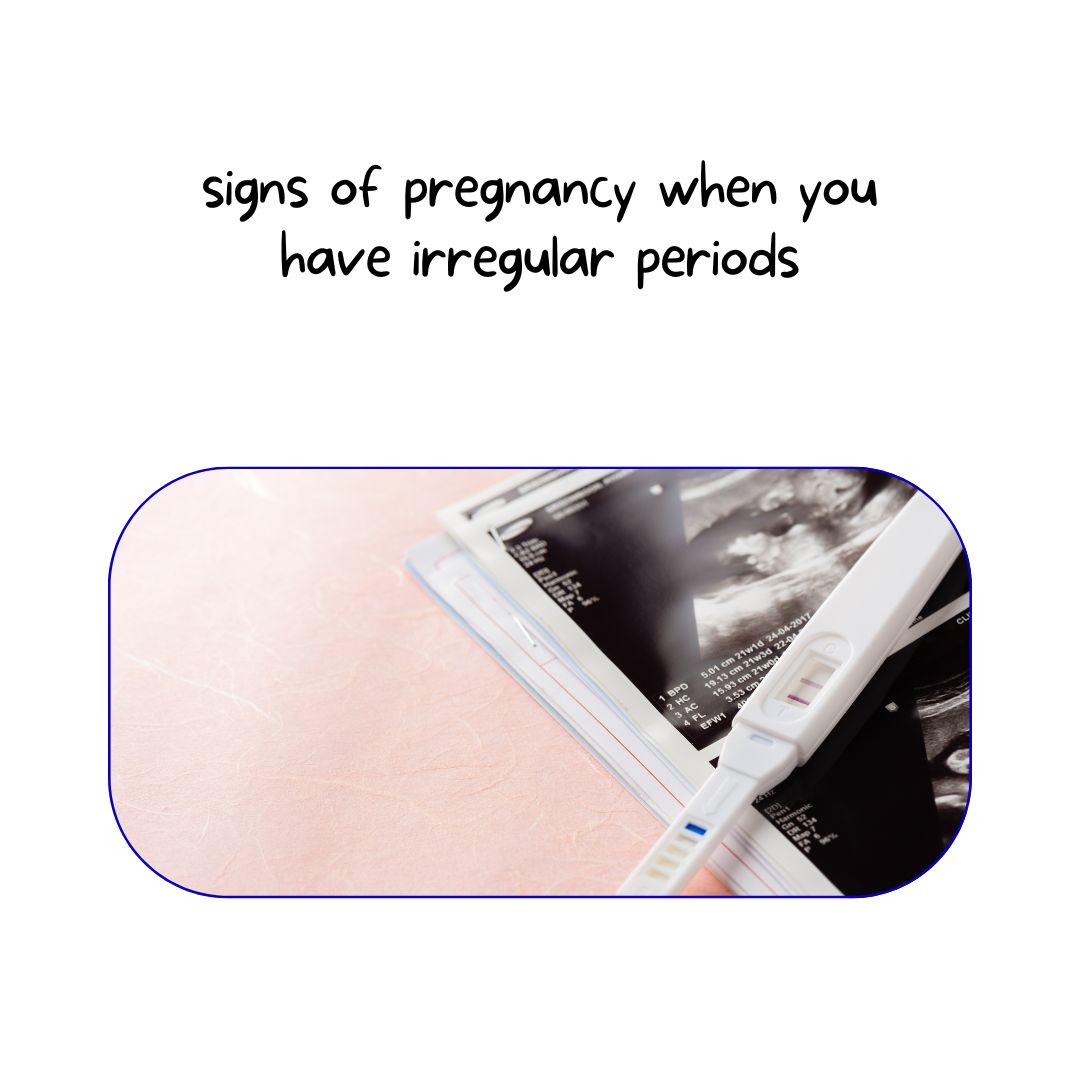Signs of pregnancy when you have irregular periods?

Signs of pregnancy when you have irregular periods? Irregular periods can make it challenging to detect pregnancy. It is essential to understand the causes of irregular periods and their association with pregnancy. In this article, we will explore the possible signs of pregnancy with irregular periods, the importance of early detection, managing pregnancy with irregular periods, and tips for women trying to conceive.
Understanding Irregular Periods
Definition of Irregular Periods
Irregular periods refer to menstrual cycles that deviate from the normal 28-30 day cycle. Women with irregular periods may experience cycles that are shorter or longer than average or have periods that occur irregularly.
Causes of Irregular Periods
There are various causes of irregular periods, including hormonal imbalances, stress, excessive exercise, polycystic ovary syndrome (PCOS), thyroid disorders, and premature ovarian failure.
Common Conditions Associated with Irregular Periods
Women with irregular periods may experience other symptoms, including acne, excessive hair growth, weight gain or loss, and mood swings.
Risks Associated with Irregular Periods and Pregnancy:
Women with irregular periods may have a higher risk of complications during pregnancy, such as preterm labor, preeclampsia, and gestational diabetes.
Possible Signs of Pregnancy with Irregular Periods
Missed Periods and Timing of Missed Periods
A missed period is a typical sign of pregnancy, but for women with irregular periods, it may be challenging to determine the timing of a missed period. Tracking the menstrual cycle can help detect missed periods and potential pregnancy.
Spotting or Cramping
Some women may experience spotting or cramping during early pregnancy. This is known as implantation bleeding and occurs when the fertilized egg implants into the uterus.
Breast Changes and Tenderness:
Pregnancy can cause breast changes and tenderness due to hormonal fluctuations. Women may experience breast enlargement, soreness, and darkening of the nipples.
Nausea and Vomiting:
Morning sickness is a common symptom of pregnancy, but it may occur at any time of the day. Women with irregular periods may experience nausea and vomiting before realizing they are pregnant.
Fatigue and Dizziness:
Pregnancy can cause fatigue and dizziness due to hormonal changes and increased blood flow. Women may experience lightheadedness and fatigue, even during the early stages of pregnancy.
Food Cravings and Aversions:
Pregnancy can cause food cravings and aversions due to hormonal fluctuations. Women may crave specific foods or have an aversion to certain smells or tastes.
Mood Swings and Emotional Changes:
Hormonal fluctuations during pregnancy can cause mood swings and emotional changes. Women may experience irritability, anxiety, or depression.
Frequent Urination:
Pregnancy can cause frequent urination due to hormonal changes and pressure on the bladder. Women may experience the need to urinate more frequently, even during the early stages of pregnancy.
Constipation and Bloating:
Pregnancy can cause constipation and bloating due to hormonal changes and pressure on the digestive system. Women may experience abdominal discomfort, bloating, and constipation.
Early Detection of Pregnancy with Irregular Periods
Importance of Early Detection for Prenatal Care:
Early detection of pregnancy is essential for receiving proper prenatal care and managing potential complications.
Options for Detecting Pregnancy with Irregular Periods:
Home pregnancy tests and blood tests are two common options for detecting pregnancy. Women with irregular periods may need to wait longer to take a home pregnancy test or have a blood test to detect pregnancy.
Managing complications associated with irregular periods during pregnancy
Irregular periods during pregnancy can increase the risk of complications such as miscarriage, preterm birth, preeclampsia, and gestational diabetes. It is important to closely monitor the pregnancy and work with a healthcare provider to manage any potential risks.
Regular prenatal care is essential for women with irregular periods during pregnancy. This includes regular check-ups with a healthcare provider, monitoring fetal growth and development, and managing any complications that arise.
Women with irregular periods may also benefit from working with a specialist, such as an obstetrician-gynecologist (OB/GYN) or a maternal-fetal medicine specialist, who can provide specialized care during pregnancy.
In some cases, medication may be prescribed to regulate hormones and manage irregular periods during pregnancy. Women with gestational diabetes may also need to closely monitor their blood sugar levels and follow a special diet.
Tips for women with irregular periods trying to conceive
For women with irregular periods who are trying to conceive, tracking menstrual cycles is essential. This can help determine the most fertile days and improve the chances of getting pregnant.
There are several methods for tracking ovulation, including ovulation predictor kits, basal body temperature monitoring, and cervical mucus monitoring. Women can work with their healthcare provider to determine which method is best for them.
Diet and lifestyle changes can also help regulate menstrual cycles and improve fertility. This may include maintaining a healthy weight, eating a balanced diet, reducing stress, and avoiding smoking and excessive alcohol consumption.
Alternative medicine, such as acupuncture and herbal supplements, may also be used to manage irregular periods and improve fertility. However, it is important to consult with a healthcare provider before using any alternative treatments.
Conclusion
In conclusion, irregular periods can make it challenging to detect pregnancy and may increase the risk of complications during pregnancy. It is important for women with irregular periods to closely monitor their menstrual cycles and seek medical advice if experiencing symptoms of pregnancy.
Regular prenatal care is essential for managing irregular periods during pregnancy and reducing the risk of complications. Women with irregular periods who are trying to conceive can benefit from tracking their menstrual cycles, making diet and lifestyle changes, and working with healthcare providers to manage their fertility.
By taking proactive steps to manage irregular periods and pregnancy, women can improve their chances of having a healthy pregnancy and a healthy baby
One Comment